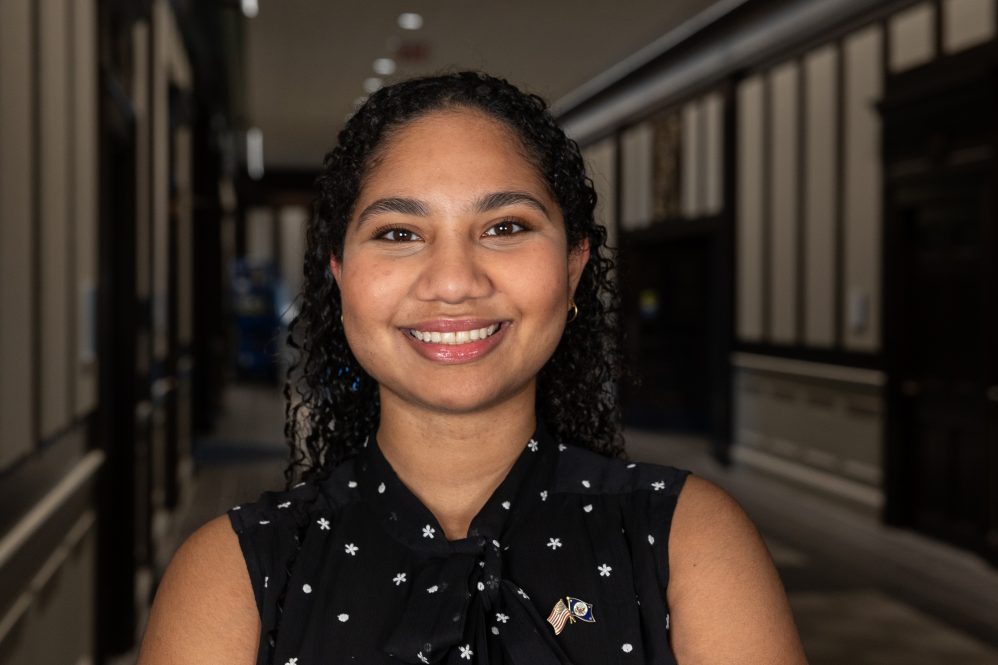Mariam Vargas ’25 (CLAS) has been named a Charles B. Rangel International Affairs Fellowship recipient. Vargas was selected among the 1,267 candidates who applied for the program, which is funded by the U.S. Department of State and administered by Howard University. She is the UConn’s first ever-recipient of a Rangel fellowship.
The program supports individuals who want to pursue careers in the foreign service of the U.S. Department of State and was established in 2003. The program was named to honor Charles Rangel, who represented New York City in Congress from 1971 to 2017.
The Rangel Fellowship will support Vargas through a two-year master’s degree in an area of relevance to the foreign service. It will also provide extensive professional development opportunities, including internships, mentors, and skills training.
As part of the Rangel Program, Vargas, who was born in Boston and raised in the Dominican Republic, will work for a member of Congress on issues related to foreign affairs in the summer of 2025. In the summer of 2026, the U.S. Department of State will send her overseas to work in a U.S. embassy or consulate to get hands-on experience.
Vargas will become a U.S. diplomat in summer 2027 and serve a five-year commitment to the foreign service, in three different locations.
“I became interested in diplomacy because my grandfather was a political prisoner in the 1960s in the Dominican Republic,” says Vargas. “I did research and read stories about my grandfather and his colleagues. The United States didn’t really understand what was going on there and there were a lot of miscommunications.
“The role of a diplomat is to prevent that from happening. So, if you are able to understand what is going on in a country and communicate that to Washington, you can influence foreign policy decisions,” she adds.
The fellowship is a “full-circle moment” for Vargas, as she describes it. In the summer of 2023, she took part in the Rangel Summer Enrichment Program, a six-week program in Washington, D.C., which provides students with an appreciation of current issues and trends in international affairs, an understanding of career opportunities in international affairs, and the knowledge and skills to pursue such careers.
Vargas has an individualized major in political science and international relations. The individualized major was established at UConn in 1975, and more than 2,500 students have graduated with a degree from the program.
“Mariam’s passion for human rights and her interest in transitional justice have inspired her to study these issues from a variety of disciplinary perspectives,” says Ken Cormier, director of the Individualized and Interdisciplinary Studies Program. “She is a diplomat at heart, buoyed by a powerful sense of optimism even in the face of serious global challenges. Mariam’s incredibly talented, and, lucky for us, she’s determined to use her talents to make positive change in the world.”
She recently was one of 14 UConn students who attended the annual United Nations Climate Change Conference of Parties, or COP29, in Baku, Azerbaijan. Climate experts, policymakers, and world leaders convene each year at the event to discuss efforts to address the climate crisis.
“Mariam has a true passion to make a difference in the fields of human rights and international affairs, and I have no doubt she will use this fellowship and as a bridge to great things,” says David Richards, an associate professor of political science and in the Gladstein Family Human Rights Institute who has been one of Vargas’ academic mentors.
“As a teacher, it’s been exciting to see the intellectual growth that led to her receiving this honor. I initially met her through a work-study research assistant program, where she worked with me as part of the CIRIGHTS Human Rights Data Project that I co-direct. First, she identified countries where corporal punishments, such as flogging, are legally administered, and then produced scores indicating the level of torture and ill-treatment in those countries. Her work and work ethic were fantastic, as was her inquisitiveness about the work, all things that I know her future mentors will quickly understand and greatly appreciate.”
Vargas is part of the BOLD Women’s Leadership Network Program at UConn, an initiative funded by the Helen Gurley Brown Foundation to provide women with holistic leadership and career development support during their junior and senior years of college. For her BOLD project, she performed a research project on obstetric violence in the Dominican Republic.
Vargas is involved in UConn’s Undergraduate Student Government and is the group’s Title IX coordinator. She is also president of the Dominican Student Association. Vargas is also a member of the Leadership Legacy Excellence program at UConn, where the most exceptional student leaders participate in a year-long leadership enhancement experience.



